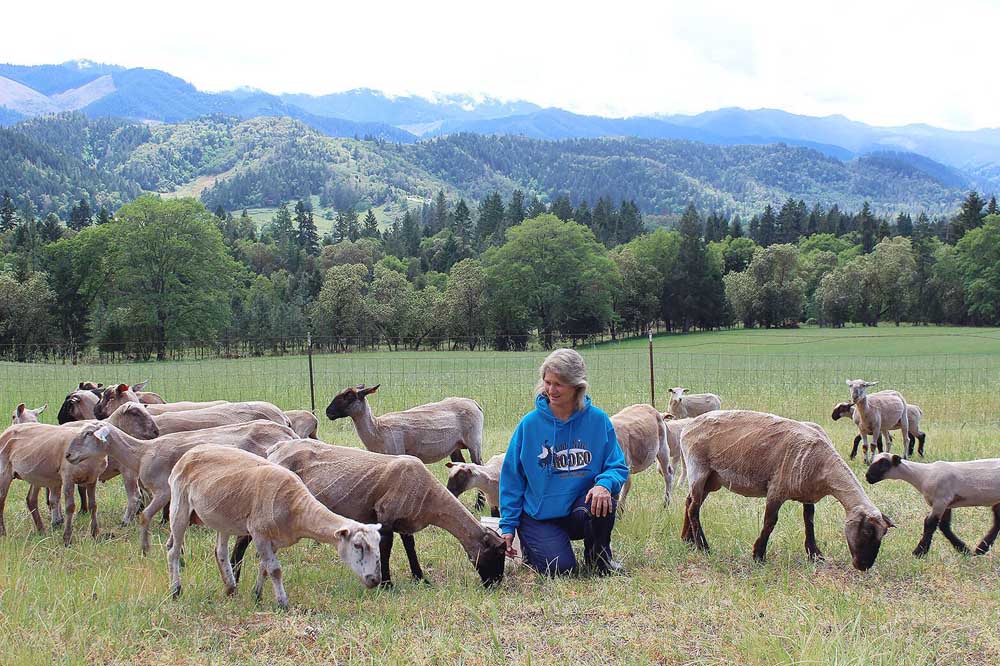County landowners weigh predator program alternatives
Published 12:53 pm Sunday, March 20, 2022

- Laura French, a sheep owner in southern Douglas County, says she is happy the county commissioners have agreed to increase the funding for the Wildlife Services program. French had previously paid a voluntary predator control district tax to support Wildlife Services, but that option was not extended by the Oregon legislature.
ROSEBURG — After a predator control district tax bill was not renewed by the Oregon Legislature during its recent short session, Coos County and Douglas County are using different funding methods to continue their Wildlife Services programs.
The two counties were the only ones in Oregon that had established the district tax when it was approved five years ago. A couple Eastern Oregon counties had shown interest in establishing a district tax for predator control.
Trending
In Coos County, the process to form a nonprofit landowner organization is underway. Landowners interested in joining would pay into the organization, at a fee per acre, with funds then distributed to keep one Wildlife Services specialist employed.
In Douglas County, its commissioners announced the county will contribute additional funds, estimated at $140,000 to $150,000, to continue to have two Wildlife Services specialists. Meetings and discussions on establishing a nonprofit landowner group are also planned.
House Bill 4080 would have allowed landowners in the state to form districts to raise money to help fund predator control by Wildlife Services. Those who supported the bill said it showed that landowners and livestock owners were willing to assess themselves a fee per acre to help support predator management, decreasing funding from counties. The program also receives funding from state and federal sources.
In its first year in Coos County, the district tax raised $75,000 at a rate of 42 cents per acre. In the recent fifth year, $90,000 was raised.
In Douglas County, an average of $35,000 was raised from the fee of 50 cents per acre during the first four years. During the recent year, the fee was raised to $1 per acre and $78,000 was raised.
“It’s so sad we lost the district concept that had worked so well for the county and the landowners,” said Jim Carr, a timber company employee and chair of the Coos County predator control board. “We want to assess ourselves for a program we all want.
Trending
“We’ll go in the direction of a nonprofit group because that is the easiest thing we know to do,” he added.
The mission of Wildlife Services is to provide leadership and expertise to resolve wildlife conflicts, allowing people and wildlife to coexist. The program’s top priority is public safety when wildlife is involved, but the specialists also deal with predators that impact agriculture and timber, ranging from raccoons in the chicken coop to elk pulling up seedlings on a mountainside.
Because the recent district tax money will be used through this year and into 2023, Coos and Douglas counties won’t have to increase its funding until next year.
“Through no fault of their own, landowners aren’t able to help fund the program now,” said Douglas County Commissioner Tim Freeman. “We really value ranching, farming and timber growing, they’re important parts of Douglas County so we felt it necessary to make up the difference.”
Officials in both counties said that without professionals in the field, land and livestock owners may be forced to deal with wildlife conflicts on their own when coyotes or cougars are killing livestock or bears are damaging timber and orchard trees. Without specialists doing the work, there’ll be no information compiled regarding conflicts.
The bill to continue the district tax program was submitted by Rep. Christine Goodwin, R-Canyonville, with support from Rep. David Brock Smith, R-Port Orford, and Rep. Mark Owens, R-Crane. But the House Environment and Natural Resources Committee, under the chairmanship of Rep. Pam Marsh, D-Ashland, didn’t vote on the bill by a legislative deadline so it failed to move forward.
Goodwin said she believed the bill failed to pass because Democratic officials don’t understand rural issues. She said she planned to bring the bill back to the next legislative session.
Carr said if landowners aren’t helping to fund the Wildlife Services program, there wouldn’t be a trapper in Coos County helping with public health and safety issues involving nuisance animals.
“No matter what the animal problem, they aren’t going to go away,” he said. “People are going to protect their timber and livestock and properties. Wildlife Services is efficient and professional with the best techniques, including teaching people to use non-lethal methods against wildlife.”
Dan Dawson, who ranches east of Roseburg and was one of the creators of the original voluntary self-assessment tax, said he was “super surprised the bill wasn’t renewed.”
“The bill is a mechanism to collect money to pay for a program that is beneficial to everyone,” Dawson said. “What happens when a cougar or a bear comes into town, or there’s a rabid fox or a disease outbreak and we don’t have professionals to deal with it?
“It’s always best to deal with the conflicts with professionals,” the rancher explained. “If not, you’re taking away the information system because Wildlife Services tracks everything. I would think that is what the public wants. It makes no sense not to have the program and to let landowners help fund it.”








